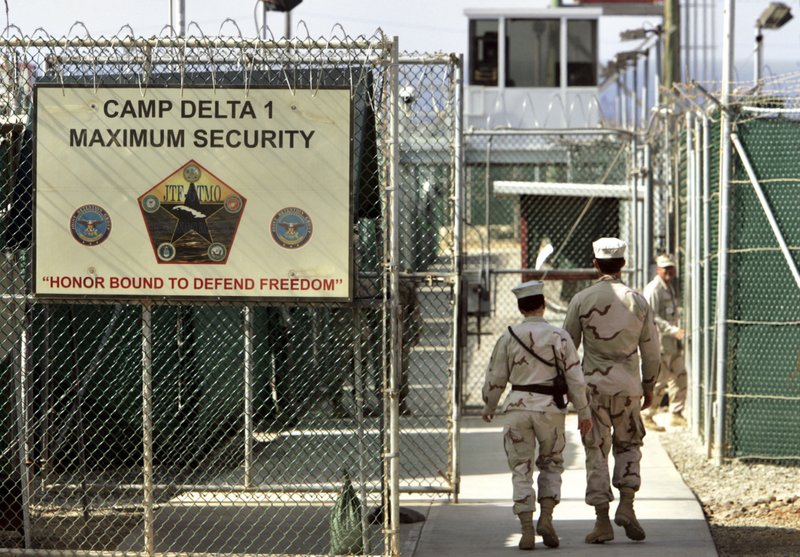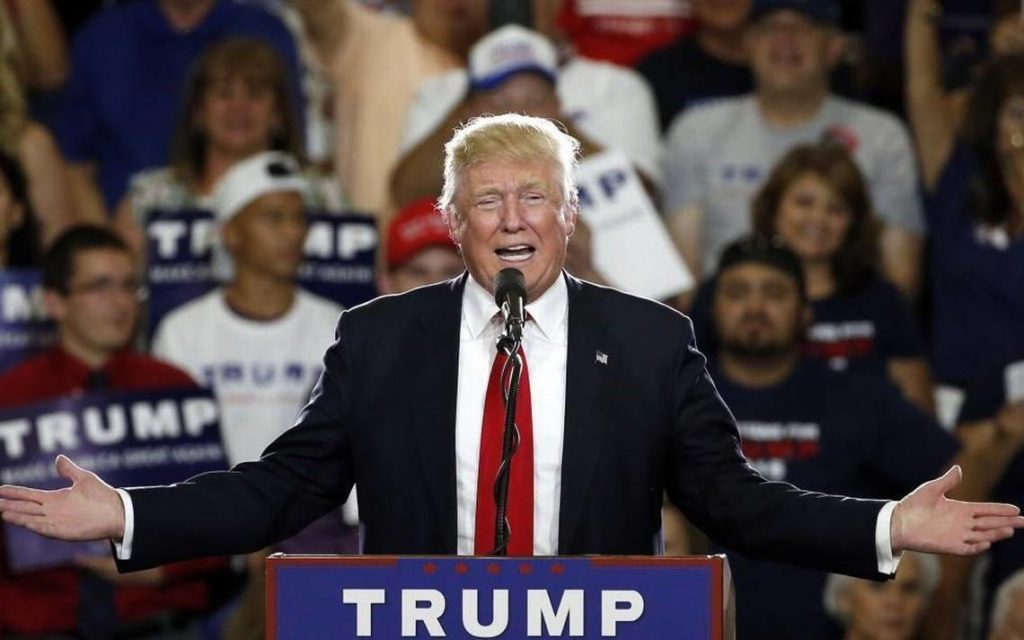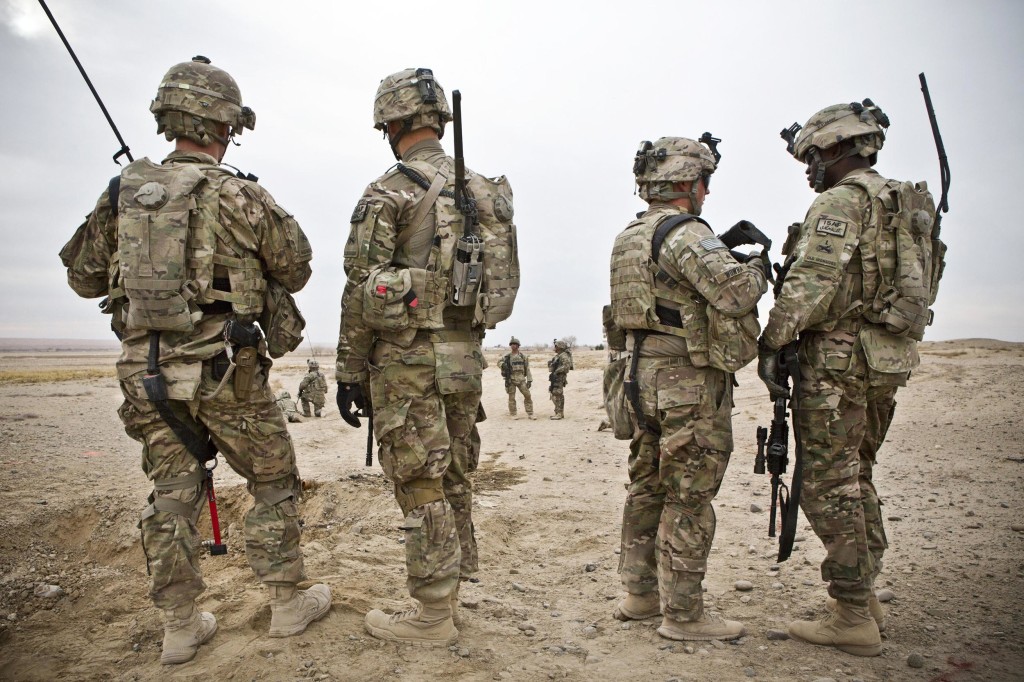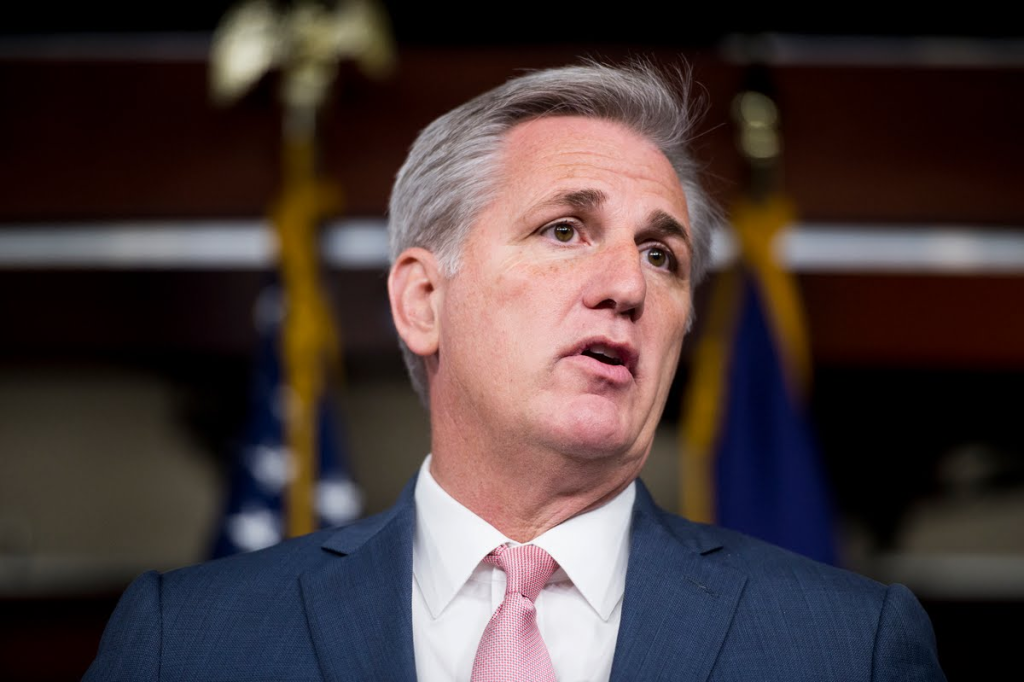Donald Trump signals changes to US interrogation, detention policy

President Donald Trump‘s renewed embrace of torture in the fight against Islamic extremism sets up a heated dispute with a long line of opponents both at home and abroad of Bush-era interrogation policies and CIA-run “black site” prisons. “We have to fight fire with fire,” Trump told ABC in an interview aired Wednesday after The Associated Press and other news organizations obtained a copy of a draft executive order that signals sweeping changes to U.S. interrogation and detention policy. The draft order would reverse President Barack Obama’s order to close the military detention center at Guantanamo Bay, Cuba — a place Trump has said he wants to fill up “with bad dudes.” It orders up recommendations on whether the U.S. should reopen CIA detention facilities outside the United States. Critics said the clandestine sites marred America’s image on the world stage. The draft directive also orders a review of interrogation methods used on terror suspects and calls for suggested modifications that would not violate the U.S. legal ban on torture. Trump, who has pushed for tougher interrogation techniques, said he would consult with new Defense Secretary James Mattis and CIA Director Mike Pompeo before authorizing any new policy. But he said he had asked top intelligence officials: “Does torture work? And the answer was ‘Yes, absolutely.’” Mattis and Pompeo did not know about the draft executive order, according to a congressional aide who was not allowed to publicly discuss the matter and spoke on condition of anonymity. When asked specifically about waterboarding, an interrogation method that simulates drowning, Trump cited the extremist group’s atrocities against Christians and others and said he wanted to do “everything within the bounds of what you’re allowed to do legally.” Provisions of the draft order are not surprising based on Trump’s remarks on the campaign trail. Trump spoke emphatically about toughening the U.S. approach to fighting Islamic State militants, saying he would re-authorize waterboarding and a “hell of a lot worse.” However, many intelligence and military officials, human rights groups and both Democratic and Republican lawmakers have widely disputed Trump’s claim that harsh interrogation methods are effective in getting critical intelligence from detainees. The AP obtained the draft order from a U.S. official, who said it had been distributed by the White House for consultations before Trump signs it. The official wasn’t authorized to speak publicly on the matter and spoke on condition of anonymity. Trump spokesman Sean Spicer said the draft order was “not a White House document.” House Speaker Paul Ryan said it was his understanding that the draft order was written by someone who had earlier worked on the Trump transition team. “This is not something the Trump administration is planning on, working on,” Ryan said. Whatever changes to U.S. interrogation and detention policy that Trump eventually proposes will face political, practical and statutory hurdles. Republican Sen. John McCain of Arizona, who was beaten as a prisoner during the Vietnam War, will be Trump’s most formidable foe on Capitol Hill. “The president can sign whatever executive orders he likes. But the law is the law. We are not bringing back torture in the United States of America,” said McCain, chairman of the Senate Armed Services Committee. After the Sept. 11, 2001, attacks, President George W. Bush authorized a covert program that led to dozens of detainees being held in secret locations overseas and to interrogation tactics that included sleep deprivation, slapping and slamming against walls, confinement in small boxes, prolonged isolation and even death threats. Three detainees faced waterboarding. Many developed psychological problems. Elisa Massimino, president of Human Rights First, said: “America paid a high price for its trip to the dark side. Our allies grew reluctant to cooperate with us and our enemies gained a potent recruitment tool that drew foreign fighters to the battlefield who killed American soldiers.” While some former government officials insist the program was effective, many others say the abuses weakened America’s moral standing in the world and hurt morale among intelligence officers before Obama shut it down. They say harsh interrogation techniques break down trust with a suspect and often prompt them to say anything to stop the harsh treatment. Retired General Charles C. Krulak, former commandant of the Marine Corps, said reviving torture is illegal, harms U.S. national security and betrays American ideals. Krulak was one of 176 retired high-ranking officers, including 33 four-star generals and admirals, who sent a letter to Trump in October urging him to denounce torture. Besides scrapping Obama’s order to close Guantanamo, the draft order would revoke other Obama directives that closed the CIA detention facilities, gave the International Red Cross timely access to all detainees and prohibited the U.S. from using any interrogation technique not listed in the Army Field Manual. Among the interrogation techniques banned by the manual were forced nakedness, hooding, beatings, sexual humiliation, threatening with dogs, mock executions, electric shocks, burning and waterboarding. Wanting to ensure that no future president could simply tear up that order, McCain teamed up with Sen. Dianne Feinstein, D-Calif., to turn it into law. Their anti-torture amendment, which was adopted in a 78-21 bipartisan vote and became law late last year, requires the Army to conduct a review of the field manual every three years in consultation with the attorney general, the FBI director and the director of national intelligence. The first review deadline is Dec. 19. Trump could rewrite the field manual to include harsher interrogation techniques, but whatever is added cannot “involve the use or threat of force,” according to the current law. That could bring the argument down to the definition of whether waterboarding or extreme stress positions, for example, constitute a “use or threat of force,” said Robert Chesney, professor at the University of Texas School of Law. Pompeo, Trump’s CIA director, said in his confirmation hearing that he would abide by all laws. But he also said he’d consult with CIA and other government experts on whether current restrictions on interrogation were an “impediment to
World jittery about Donald Trump’s ‘America first’ inaugural speech

President Donald Trump‘s inaugural speech promised “America first” policy led by a forceful executive, in contrast to the coalition building and international conferences which have featured strongly in past administrations. The billionaire businessman and reality television star — the first president who had never held political office or high military rank — promised to stir a “new national pride” and protect America from the “ravages” of countries he says have stolen U.S. jobs. “This American carnage stops right here,” Trump declared. In a warning to the world, he said, “From this day forward, a new vision will govern our land. From this moment on, it’s going to be America first.” A look at some reactions from around the world: ___ AFGHANS DISAPPOINTED BUT HOPEFUL Like many in the Afghan capital of Kabul, restaurant owner Mohammad Nahim watched the presidential inauguration ceremonies but was disappointed to not hear any mention of Afghanistan. “Trump did not mention a word about Afghanistan in his speech and the salaries of the Afghan army and police are paid by the U.S.,” he said. He added that if the U.S. stops helping Afghanistan, “our country will again become a sanctuary to terrorists. I hope Trump will not forget Afghanistan.” Mohammed Kasim Zazi, a shopkeeper whose home is in eastern Afghanistan’s Khost province, where the feared Haqqani network is prominent, said he expected Trump to stay focused on Afghanistan. “Trump said he will finish the terrorists in the world and that has to mean that Afghanistan will remain in the sights of the U.S.” said Zazi. Chief Executive Abdullah Abdullah said he was encouraged by Trump’s speech to soldiers in Bagram. “There he announced his support to the troops and the continuation of support for their troops here and strengthening their troops, which is a good and elegant step and I am sure that our cooperation in other areas will continue as well.” ___ SPEECH RESONATES IN MEXICO Perhaps no country was watching the speech more closely than Mexico. Trump has made disparaging remarks about immigrants who come to the United States illegally and sought to pressure companies not to set up shop in Mexico by threatening a border tariff on goods manufactured there and exported to the United States. So Trump’s talk of “protect(ing) our borders,” ”America first” and “buy American and hire American” had particular resonance in America’s southern neighbor. Ricardo Anaya Cortes, president of the conservative opposition National Action Party, called for “the unity of all Mexicans, unity in the face of this protectionist, demagogic and protectionist speech we just heard. Unity against that useless wall, against deportations, against the blockade of investment.” “The challenge is enormous. … We demand the federal government leave aside tepidity, that it tackle with absolute firmness and dignity the new relationship with the United States,” Anaya said. The United States is by far Mexico’s largest commercial partner, buying some 80 percent of its $532 billion in exports in 2015. Mexico is the second-largest market for U.S. exports. “At least the word ‘Mexico’ was not heard in the speech. Nevertheless one can expect the United States to launch a hyper-protectionist project,” said Ilan Semo Groman, a researcher at Iberoamericana University. If Trump truly moves to block or drive away U.S. investment in Mexico, Semo said Mexico should focus its commercial efforts on other countries. “There are very clear possibilities,” Semo said. Mexican President Enrique Pena Nieto sent three tweets after Trump’s inaugural speech Friday: — “I congratulate @realDonaldTrump on his inauguration. We will work to strengthen our relationship with shared responsibility.” — “We will establish a respectful dialogue with the government of President @realDonaldTrump, to Mexico’s benefit.” — “Sovereignty, national interest and the protection of Mexicans will guide the relationship with the new government of the United States.” ___ PAKISTAN WORRIES ABOUT MUSLIM COMMENTS A group of retired government officials gathered after morning prayers for a walk in a sprawling park in the heart of the federal capital of Islamabad and the topic of their conversation was President Trump’s inaugural speech. They expressed concern that Trump would target the Islamic world, particularly Pakistan, because of his campaign rhetoric about Muslims as well as his inaugural speech in which he promised to eradicate Islamic terrorism worldwide. Pakistan has often been accused of harboring militant insurgents and declared terrorist groups that have targeted neighboring India, against whom Pakistan has fought three wars, as well as Afghanistan. Pakistan denies the charges. “Likely there is more trouble in store for the Islamic world and our country will take the most brunt of the harsh treatment from President Trump administration,” said Mohammad Afzal. His sentiments were echoed by Shafiq Khan, who said “the one main thing that the new president mentioned about the world outside America is to tackle Islamic radicalism and that should be the matter of concern for all of us.” Amanaullah, a school teacher in Islamabad, feared Trump’s reference to eliminating radical Islamic terrorism. “I think under this name he wants to malign and eliminate Islam,” he said. Umair Khan, an engineer, said of Trump: “Let him taste the burden of government and get settled, I am sure he will calm.” ___ CONCERN IN TOKYO Some Tokyo residents are worried that Trump’s “America first” policy will usher in an era of populism and protectionism at the expense of the rest of the world. Tadashi Gomibuchi, who works in the manufacturing industry, recorded Trump’s inauguration speech overnight as he was keen to hear what the new president had to say. “Trump is trying to make big changes to the way things are. Changes are good sometimes, but when America, the most powerful, loses stability … it’s a grave concern,” he said. “If you take his words literally, it may destabilize the world going forward and I’m really worried. I hope things will lead to a soft landing.” Retiree Kuninobu Inoue, who lived in the U.S. during the 1990s, is concerned about trade frictions between Japan and the U.S, citing Trump’s decision
Bradley Byrne: A bipartisan vote to stand with Israel

The United States has no stronger ally than Israel. Our relationship has always been strong, both economically and militarily. Israel plays an especially important role in helping us combat radical Islamic terrorism in the Middle East. In other words, Israel serves as a beacon of hope, freedom, and opportunity in a very dangerous part of the world. That is why support for Israel has always been a bipartisan priority shared by Democrats and Republicans. While serving in Congress, I have had the opportunity to visit Israel on multiple occasions to meet with the leaders and discuss the relationship between our two countries. During these trips, the Israeli people always share their deep appreciation for the partnership between our two countries, but they also make clear the fact they face very significant challenges. For decades now, Israel has been in a long running dispute regarding its very right to exist. The dispute is complicated and deeply personal as it is based on religious, ethnic, and cultural ties. This struggle has resulted in multiple wars and placed Israel in a constant state of conflict. Given the importance of the relationship between the United States and Israel and the sensitivities related to the ongoing conflict with the Palestinian Authority, I was deeply disappointed to see the United Nations (UN) recently pass a flawed, anti-Israel resolution that will only make it more difficult to achieve peace. Since 1972, the United States has used our position as a UN Security Council member to veto 42 anti-Israel amendments. As the vote grew closer on this most recent resolution, the hope was that the United States would once again use our veto power. Instead, the United States Ambassador “abstained” from the vote altogether. In other words, the United States turned our back and looked the other way as the UN passed a flawed resolution attacking Israel. This represents a dangerous break in a long-standing and bipartisan policy to protect our sole democratic ally in the region from one-sided resolutions at the UN. This resolution does absolutely nothing to solve the underlying issues. In fact, it muddies the water and only further complicates what is already a very complex issue. The resolution also failed to make mention of the fact that Hamas, an internationally recognized terrorist organization, continues work with the Palestinian Authority and engage in hostile actions against Israel. To be clear: no solution to the ongoing problems with Israel and the Palestinian Authority is going to come from an international body, like the United Nations, telling them what to do. Any real solution must come from negotiations between the involved parties. Given the many blunders from the Obama Administration on the world stage, I guess this most recent action should not be all that surprising. But this action is one of the most irresponsible acts ever by an outgoing President. It will be a dark stain on an already disastrous foreign policy legacy. Last week, as one of the first actions in the new year, the House of Representatives passed a bill opposing the UN’s anti-Israel resolution and condemning the inability of the Obama Administration to stand up for Israel. This wasn’t a one sided vote. In fact, 109 Democrats joined with 233 Republicans to pass the resolution with over 340 votes. This is a strong message to our friends in Israel that the United States still has their backs. Now is the time to stand up for Israel, not turn away from them. It is my sincere hope and belief, that under President-elect Donald Trump, the United States will once again stand arm-in-arm with Israel. This bipartisan resolution was an important step in that direction. • • • Bradley Byrne is a member of U.S. Congress representing Alabama’s 1st Congressional District.
Updates from the 1st presidential debate

The Latest on the first of three presidential debates between Democrat Hillary Clinton and Republican Donald Trump (all times EDT): 10:45 p.m. Both candidates concluded the first presidential debate by saying they will accept the outcome if the other wins. Hillary Clinton spoke directly to viewers and said, “It’s not about us, it’s about you.” Donald Trump initially dodged the same question, saying he would make a “seriously troubled” America “great again.” He added: “I’m going to be able to do it. I don’t believe Hillary Clinton will.” But Trump finished his answer by saying that if Clinton wins, “I will absolutely support her.” ___ 10:43 p.m. Hillary Clinton is punching back at Donald Trump’s assertions that she doesn’t have the “stamina” to be president. Trump has questioned whether Clinton has the physical fitness to be president and he repeated the criticism to her directly during the debate. Clinton’s response? Trump shouldn’t talk about stamina until he’s tried out the busy schedule she kept up as secretary of state. Trump didn’t answer moderator Lester Holt’s original question about his past comments that Clinton doesn’t have the “presidential look.” Clinton suggested the remarks were about gender, and she reminded the crowd of Trump’s past comments calling women “pigs” and other derogatory names. ___ 10:42 p.m. Donald Trump says NATO needs to “go into the Middle East with us” to combat the Islamic State group. And he is taking credit for NATO focusing resources on combating terrorism. In fact, the alliance agreed in July to contribute aircraft and conduct training in Iraq and has increased intelligence coordination there. And NATO set up an anti-terrorism program in 2004 — years before Trump criticized them as a presidential candidate. Earlier this year, Trump criticized NATO for not focusing on terrorism. He said that afterward, he saw an article reporting that NATO was opening a new, major anti-terrorism division. He said Tuesday that NATO’s action was “largely because of what I was saying, and my criticism of NATO.” ___ 10:40 p.m. Donald Trump is avoiding a specific declaration on how he would use nuclear weapons if he’s elected president. The Republican nominee said during the first presidential debate that he “would not do first strike” because “once the nuclear alternative happens, it’s over.” That statement suggests he would not authorize a nuclear attack unless the U.S. was struck first. But in the same answer Trump said he “can’t take anything off the table.” He mentioned adversary nations such as North Korea and Iran. President Barack Obama has considered changing existing policy to state clearly that the United States would not deploy nuclear weapons without first being attacked by nuclear weapons. But he met resistance and has elected not to make such a shift. ___ 10:38 p.m. Hillary Clinton is accusing Donald Trump of being too easily provoked to keep the United States from going to war — perhaps even one involving nuclear weapons. Trump says: “I have much better judgment than she does. I have much better temperament.” That drew laughs from some in the debate crowd, and prompted Clinton to exclaim: “Woo! OK!” Clinton then pivoted to policy, defending the U.S.-led war in Afghanistan. Clinton said Iran was “weeks away” from a nuclear bomb when she became secretary of state — and says the Obama administration thwarted that progress. She continued that Trump didn’t have “good judgment or the right temperament” because he could take the country to war over small issues, like being mocked on Twitter. ___ 10:35 p.m. Donald Trump is continuing to insist he opposed the Iraq War before the U.S. invasion despite evidence to the contrary. Trump says during the debate that he “did not support the war in Iraq,” calling that charge “mainstream media nonsense.” But there is no evidence Trump expressed public opposition to the war before the U.S. invaded. Trump was asked in September 2002 whether he supported a potential Iraq invasion in an interview with Howard Stern. Trump briefly hesitated, then responded: “Yeah, I guess so.” Presented with the comment during the debate, Trump responds: “I said very lightly, I don’t know, maybe, who knows.” He’s also telling reporters to call Fox News host Sean Hannity to confirm private conversations he said they had about the war. Hannity is a top Trump supporter. Clinton voted in favor of the invasion in 2002 while she was a New York senator. She has since said it was a mistake. ___ 10:27 p.m. Donald Trump is interrupting the moderator of the first presidential debate to insist he has the best temperament for the office. Trump repeatedly made the assertion after clashing with moderator Lester Holt over his early support for the Iraq War. Then he segued to his temperament. “I think my strongest asset by far is my temperament,” Trump said. “I know how to win.” Clinton and her allies have repeatedly hit Trump over his temper and inability to take criticism. ___ 10:23 p.m. Hillary Clinton says one key to fighting terrorism in the United States is working closely with Muslims living here. Clinton says Donald Trump has “consistently insulted Muslims abroad, Muslims at home.” She says Muslim people can provide information that law enforcement may not be able to obtain anyplace else. Both candidates were asked to explain how they would combat terrorism in the U.S. Clinton says her plan includes an intelligence surge to obtain “every scrap of information” and to “do everything we can to vacuum up intelligence from Europe, from the Middle East.” ___ 10:20 p.m. Hillary Clinton says defeating the Islamic State group and taking out its leaders would be a top priority as president. Clinton says she’s hopeful the Islamic State group would be pushed out of Iraq by the end of the year. She says the U.S. could then help its allies “squeeze” the terrorist group in Syria. Clinton says she would do everything possible to take out the group’s leaders, and make that one of her administration’s organizing principles
Guns, immigration and Zika top agenda as Congress returns

Gun control, immigration and money to combat the Zika virus top the congressional agenda as lawmakers sprint toward the political conventions this month and a seven-week summer recess. Amid all that, Republicans plan to squeeze in a meeting with Donald Trump on Thursday. The House and Senate have just eight legislative days before their break, and lawmakers have scheduled a handful of politically charged votes with implications for incumbents in November’s election. In the House, legislation to fight terrorism and a gun control measure that already failed in the Senate are planned for this week. House Speaker Paul Ryan said a GOP plan to keep suspected terrorists from obtaining firearms would do so “without compromising a citizen’s basic bill of rights,” including the rights to bear arms and receive due process under the law. In the Senate, immigration bills and legislation to impose labeling on genetically modified food are on tap. Unclear is whether Republicans and Democrats can resolve the dispute over funds for the mosquito-borne Zika virus now that summer is in full swing, or whether the matter will have to wait until September when Congress returns. A look at the issues: ___ ZIKA Back in February, President Barack Obama requested $1.9 billion in emergency money to fight Zika, which causes grave birth defects and has infected 287 pregnant women in the United States and 250 in U.S. territories, according to the most recent numbers from the Centers for Disease Control. Congress has failed to fund the request as the issue has been caught up in partisan fights and the typical dysfunction. House Republicans rammed through a bill that would provide $1.1 billion by cutting money from other government agencies. The legislation, to the anger of Democrats, would bar new funding for Planned Parenthood clinics in Puerto Rico and allow pesticide spraying that environmentalists argue would be harmful. Senate Democrats have blocked the bill and another vote is expected this week, although progress is unlikely. ___ GUN CONTROL Bowing to election-year pressure from Democrats, Ryan, R-Wis., says the House will vote on a GOP proposal aimed at keeping suspected terrorists from obtaining firearms, a measure backed by the National Rifle Association. Democrats want to vote on their own gun control bills, and they haven’t ruled out a return to disruptive tactics if they’re rebuffed. Ryan indicated on Tuesday that Democrats are unlikely to get a vote. Democrats staged a sit-in on the House floor that lasted nearly 26 hours last month to call attention to their demand for gun-control votes. The sit-in followed the June 12 mass shooting in Orlando, Florida, that killed 49 people and heightened attention on the national toll taken by firearms. The GOP bill would let the government block firearms purchases for suspected terrorists, but only if prosecutors can prove in court that the buyer is involved in terrorism. It would also establish a new office within the Department of Homeland Security to focus on preventing extremist groups from recruiting followers. Democrats say the Republican bill is too weak. They want votes on one measure expanding background check requirements for gun buyers, and a second banning firearms sales to terror suspects without requiring prosecutors to first prove the buyer was embarking on terrorism. ___ FAA REAUTHORIZATION Key House and Senate lawmakers are close to a deal on a bill to extend the Federal Aviation Administration’s programs and policies, which are due to expire on July 15. Rep. Bill Shuster, R-Pa., chairman of the House Transportation Committee, has agreed to temporarily drop his contentious plan to privatize the nation’s air traffic control system in order to allow a bill to move forward. Negotiations have focused on what policy provisions to include in the extension. There is strong support in both chambers to include an array of proposals to enhance airports security in light of recent airport attacks in Istanbul and Brussels. Proposals to extend new protections to airline consumers, relax medical requirements for private pilots and lift some restrictions on commercial drone flights are also under discussion. ___ TRUMP House and Senate Republicans are slated to meet with the GOP’s presumptive presidential nominee less than two weeks before the party convention in Cleveland. Among those expected to attend the separate sessions are Sens. Bob Corker of Tennessee, Jeff Sessions of Alabama and Joni Ernst of Iowa, all of whom have been mentioned as possible running mates for the blustery billionaire. Trump’s short list of possible vice presidential candidates is heavy with Washington insiders who could help usher his agenda through Congress. ____ IMMIGRATION Senate Democrats are expected to block a GOP bill that would withhold congressional funding from so-called sanctuary cities that shield residents from federal immigration authorities. Republicans also are proposing a bill to impose a mandatory minimum sentence of five years for any person who illegally re-enters the country after being removed. Republicans have pushed for action since last year when 32-year-old Kathryn Steinle was shot in San Francisco. The man charged in the killing was in the country illegally despite a long criminal record and multiple prior deportations. He had been released by San Francisco authorities despite a request from federal immigration authorities to keep him detained. Republished with permission of the Associated Press.
Planned Donald Trump speech to pivot from Hillary Clinton to terror, immigration following Orlando attack

Following the nation’s most deadly mass shooting that left 50 dead at a gay nightclub in Orlando, Donald Trump said Sunday he will change the subject of a planned Monday speech to address “this terrorist attack, immigration, and national security.” Trump had originally planned to use the speech to present a litany of attacks against Democratic front-runner Hillary Clinton. According to senior Trump campaign staff, the presumptive GOP nominee was going to serve up a “charge sheet” against Clinton, including broadside attacks on her infamous private email server, her handling of the Benghazi consulate attack, and allegations for the former Secretary of State tried to silence women who may have been involved with her husband, former President Bill Clinton. While Republican consultants and party leaders have advised Trump to avoid the more personally tinged attacks, most of which date back decades, events have forced Trump to abandon the speech altogether. Trump said in a statement Sunday he will instead continue a favored line of argument: the need to “get tough” on what he called radical Islamic terrorism and stem the tide of immigration from Muslim-majority countries. Earlier in the day Trump said he “appreciated the congratulations” from supporters who said he was right to make Islamic terrorism a central focus of his campaign, and claimed credit for predicting more attacks would afflict the nation. “What has happened in Orlando is just the beginning. Our leadership is weak and ineffective. I called it and asked for the ban. Must be tough,” Trump tweeted on Sunday. In the statement, Trump fixated on the attacker’s Muslim and Middle Eastern origins, rather than his anti-gay views or his use of a legally purchased AR-15 assault rifle in the deadly dance club siege. “The terrorist, Omar Mir Saddique Mateen, is the son of an immigrant from Afghanistan who openly published his support for the Afghanistani Taliban and even tried to run for President of Afghanistan,” said Trump. “According to Pew, 99 percent of people in Afghanistan support oppressive Sharia Law.” Trump brandished those facts as evidence in favor of his notorious plan to ban Muslims from immigrating to the United States. “We admit more than 100,000 lifetime migrants from the Middle East each year. Since 9/11, hundreds of migrants and their children have been implicated in terrorism in the United States,” said Trump. “Hillary Clinton wants to dramatically increase admissions from the Middle East, bringing in many hundreds of thousands during a first term – and we will have no way to screen them, pay for them, or prevent the second generation from radicalizing. “If we do not get tough and smart real fast, we are not going to have a country anymore. Because our leaders are weak, I said this was going to happen — and it is only going to get worse. I am trying to save lives and prevent the next terrorist attack. We can’t afford to be politically correct anymore,” Trump continued. Trump made no specific reference to the apparent anti-LGBT motivation behind the shooter’s attack. Trump will give his revamped remarks on Monday at New Hampshire Institute of Politics at St. Anselm’s College in Manchester, NH.
Kay Ivey: Alabama’s longstanding partnership with Israel

Alabama has a long history of strong support for the State of Israel. Alabama lead the nation as the first state to officially call for the establishment of the Jewish state and homeland. At a time in the midst of World War II, when war was waging between America and Nazi Germany, but also systematic extermination and mass murders of the Jews in Europe was occurring, the Alabama Legislature made a pledge to stand with Israel. In 1943, a Joint Resolution was unanimously adopted. For more than 70 years, the State of Alabama has repeatedly demonstrated its pledge to stand with Israel. In 1981, Governor Fob James hosted a celebration of the 33rd Anniversary of Israel’s rebirth as a nation at the Governor’s mansion. In 1997, Alabama and Israel entered in a State-to-State Trade Agreement, signed by Governor James, to promote the exchange of manufacturing goods. In 2012, Israel ranked as Alabama’s ninth leading trade partner. Trade continues today as Alabama has exported $37 million of goods to Israel in 2015. In the wake of the September 2001 terrorist attacks, the Alabama Legislature passed another Joint Resolution to express support for Israel and for all the people suffering at the hands of terrorism. Governor Bob Riley declared August 14, 2006, “Stand with Israel Day” in Alabama. In 2012, Governor Robert Bentley and other state leaders publicly supported Israel to defend itself against years of deadly rockets fired from the Palestinian-controlled Gaza Strip. In 2013, by way of a Proclamation by the Governor, Alabama once again expressed its steadfast support of the State of Israel. On April 7, 2016, the Alabama Legislature invited Deputy Speaker of the Israeli Knesset, Hilik Bar, to address a Joint Session of the Legislature. Speaker Bar is the highest ranking Israeli official to visit Alabama. On the same day, SB81 by Senator Orr was passed out of the Senate that would require that all government entities must include a provision in certain purchasing contracts assuring that the business providing the good or service is not currently engaged in, and will not engage in, the boycott of an entity doing business with a jurisdiction with which the state can enjoy free trade. SB81 is currently awaiting passage by the House. In a time when the Middle East is threatened by terrorism, Israel’s sovereignty continues to be challenged. Alabama has proved for more than 70 years that our support is unwavering. As the first state in the country to call for the establishment of the State of Israel, Alabama stands committed to the existence and establishment of the democratic state in the Middle East. We will continue to contribute efforts to strengthening our state-to-state relationship. Alabama remains committed to stand with Israel. • • • Kay Ivey is the lieutenant governor of Alabama. Elected in 2010, she was the first Republican woman to hold the office in Alabama’s history.
Jonathan McConnell: The problem with the EU’s new refugee plan

The first lesson you learn in Economics 101 is that people respond to incentives. Whether we’re talking about insurance, welfare, or hiring a new employee–incentives matter. That doesn’t change when we start talking about immigration or the refugee situation in the Middle East. Right now the incentives involved in the migration and refugee problem do not align with the stated goal of creating a stable region and minimizing human rights atrocities. I recently returned from a business trip to Turkey, from where millions of refugees have fled in the last several years into Greece and other members of the European Union (EU). Today an arrangement between Turkey and the EU went into effect, sending more than 200 people back to Turkey from Greece, in an effort to stem the flow the wave migrants and refugees that has begun choking the EU in recent years. Under the agreement, for every certified Syrian refugee sent to Turkey, one must also be sent for permanent settlement in the EU. Of the migrants sent back to Turkey today, not a single one was a Syrian refugee. The EU, Turkey, and Greece can contemplate how to halt the flow of migrants all they want, but it will not work until those nations, with backup from the United States, stop incentivizing bad behavior and empower Turkey and Syria to take matters into their own hands. The acceptance of hundreds of thousands, even millions, of refugees has allowed ISIS, with its relatively small fighting force, to gain a significant foothold in Syria—and they’re moving toward Turkey. Much how the United States’ immigration policy, or lack thereof, of allowing illegal immigrants to collect benefits and stay in the country with little or no negative ramifications has encouraged illegal immigration and stifled legal immigration, not incentivizing Syrians and Turks to stay and fight for their own nations will leave a negative impact across the globe. In Hamburg, Germany, for example, there are three Immigration camps which have effectively taken over those portions of the city. The police are reportedly not allowed to go into those portions of the city, and German citizens are leaving their homeland at a rapid rate. They feel their homeland has been taken over and do not feel safe. We are not going to stop the mass exodus of refugees without fixing the underlying tensions and problems. Simply shuffling refugees around the globe without a plan to require the Syrian and Turkish people to take responsibility for their land will only worsen the problem. After all, if a massive amount of people want to come to the United States because it is the land of opportunity, then why would we are only further incentivizing Syrians to flee their country by giving them a fast-track option through declaring refugee status. Syria is just one troubled area. There are an estimated 60 million refugees worldwide who are displaced from their homes. Europe is getting refugees from Libya, Algeria, Tunisia, and other North African countries, all displaced due to insecurity in their homeland. Whether the refugees are here in the United States, in the EU, or in Turkey, all of this insecurity, from the Middle East to Africa, can be credited to the Global Jihad Movement. The world must first recognize the Global Jihad Movement, then strengthen its resolve to destroy it. This effort must be led by Arab countries. Arab countries must take the lead in ridding the world of this radical ideology. For the U.S. to continue to meddle in the Middle East without Arab leadership is only to embolden Jihadist into fighting against an invading force. Politics aside, we may be divided on economic and social policy, as a world, we must unite to protect our way of life. The atrocities of Belgium and Paris are a mere body of water away. • • • Jonathan McConnell is the owner of Meridian Global Consulting, LLC, a maritime security firm, a Marine, and a former Republican U.S. Senate candidate.
Bradley Byrne: We still don’t have a strategy to fight ISIS

For over a year now, I have been pointing out that the Obama Administration lacks a clear strategy to defeat the Islamic State of Iraq and Syria (ISIS). This is the brutal terrorist organization that holds significant territory in the Middle East and claims responsibility for attacks in Brussels, Paris, and San Bernardino, California. When I visited the Middle East a few years ago, ISIS was gaining power and influence. In each country, I heard from American allies who were worried about ISIS and the lack of leadership from the United States. No one expected the United States to lead the fight alone, but they looked to us for guidance. Instead of leading, the President called ISIS a “JV team” and refused to acknowledge that our actions in Syria and Iraq were contributing to ISIS’s growth. At the same time, Syria was engaged in a violent civil war and Iraq’s military was falling apart. The United States has since started air strikes intended to disrupt ISIS operations and kill ISIS leadership. A few other countries have joined those efforts, but we still lack the large-scale support from U.S. allies that is needed to defeat ISIS. Don’t get me wrong: a number of American service members are doing a valiant job to defeat the enemy, but Administration has not given them a winning strategy. In other words, it doesn’t matter how great the athletes are on a football team if the coach does not have a game plan on how to win the game. That’s the challenge facing our military today. With this in mind, Congress included a provision in the annual National Defense Authorization Act last year that required the Obama Administration to submit a plan outlining their strategy for the Middle East and to defeat ISIS. The law couldn’t have been clearer. It said the report should be submitted to Congress “not later than February 15, 2016.” Well, February 15th came and passed without a plan being submitted to Congress. A few weeks ago, Secretary of Defense Ash Carter, who was responsible for submitting the report, testified before the Armed Services Committee about his annual budget request. I used the hearing to ask Secretary Carter why he had failed to submit the report on time as required by law. When an average American violates the law, there are consequences. The same should apply to leaders in the federal government. No one, regardless of their political position, should ever be above the law. I asked the Secretary where the report was and if he agreed the law was broken. Secretary Carter failed to answer my questions and simply said the report’s release was “imminent.” Well, two days later and over a month late, the report was submitted to Congress. It was only seven pages long and lacked a clear strategy. It reminded me of a kid who forgot to do their homework, so they recklessly threw something together at the last minute. Either the Obama Administration didn’t take the request from Congress seriously or they actually don’t have a strategy to defeat ISIS and combat Islamic extremism in the Middle East. I fear that both of those are true. Only the President, as the Commander-in-Chief of the military, can put forward a strategy for our military. So far, President Obama has failed to do that and ISIS continues to grow. In Congress, it is our job to continue holding the President and his advisors to the fire until they follow the law. As a member of the Armed Services Committee, I will continue doing just that. The safety and security of the American people require it. • • • Bradley Byrne is a member of U.S. Congress representing Alabama’s 1st Congressional District.
Alabama reacts to terror attacks in Brussels

Across the globe, people mourned with the Brussels after the Belgian capital was attacked by three suspected terror attacks on Tuesday. Attackers detonated twin blasts at the Zaventem airport and one at the Maelbeek subway train beneath the the European Union’s capital — killing at least 34 people, leaving more than 170 wounded. Alabama politics leaders have expressed their shock at the attacks in Brussels Tuesday. Here are some of the reactions: U.S. Senator Richard Shelby via Facebook: My thoughts are with those impacted by the horrific acts of terrorism in Belgium this morning. Join me in praying for the families and victims. U.S. Rep. Bradley Byrne (AL-01) via Facebook: Devastating reports out of Belgium this morning as we are reminded of the continued threats and constant need for vigilance. Please join Rebecca and me in praying for all of those impacted by these heinous acts of terror. U.S. Rep. Martha Roby (AL-02) via Facebook: Terrible news from Belgum this morning and a stark reminder about the dangerous threat terrorism continues to pose worldwide. Belgium is our NATO ally. The United States stands in solidarity with the Belgian people and we offer prayers for the victims and their families. U.S. Rep. Robert Aderholt (AL-04) via Facebook: My thoughts and prayers go out to the people of Belgium this morning. They are our allies and friends and we must do everything possible to stop the spread of radical Islam and the fruit it bears.
In Cuba, Barack Obama briefed on Brussels terrorist attack

President Barack Obama, traveling in Cuba, was briefed Tuesday morning on the Brussels attacks that killed dozens of people. The White House said the U.S. was in contact with Belgian officials about the explosions at the Brussels airport and subway system. Secretary of State John Kerry said in a statement that the U.S. was working “to determine the status of all American citizens in Brussels.” The embassy there issued a statement telling Americans to stay where they are and “take the appropriate steps to bolster your personal security.” At least one of the attacks was believed to be caused by a suicide bomber, and Belgium raised its terror alert to its highest level. Rep. Adam Schiff, D-Calif., the ranking member of the House intelligence committee, said the attacks “bear all the hallmarks” of an Islamic State group coordinated or inspired attack. His staff said he received a preliminary briefing Tuesday from U.S. officials. Schiff says it’s unclear if encrypted communications played a role in the attacks but noted that the Brussels attacks occurred despite the city being under constant vigilance. The U.S. Department of Homeland Security said it was closely monitoring the unfolding events and “would not hesitate to adjust our security posture, as appropriate, to protect the American people.” DHS reiterated that members of the public should report any suspicious activity in their communities to law enforcement authorities. Attorney General Loretta Lynch was also briefed on the attacks, Justice Department officials in Washington said. They said the Justice Department and the FBI was coordinating with other U.S. government agencies, as well as with Belgian counterparts. Last week U.S. Homeland Security Secretary Jeh Johnson said Homeland Security officials constantly monitor world events and evaluate whether there is a need to either publicly raise the nation’s security posture or issue another bulletin via the government’s National Terror Advisory System. Such a bulletin was issued in December advising the public that federal law enforcement was concerned about the possibility of homegrown violent extremists and terrorist-inspired individuals. Republished with permission of the Associated Press.
In wake of Paris attacks, House voting to tighten controls on visa-free travel to US

Invoking the Paris terror attacks, House lawmakers pushed toward a vote Tuesday on legislation tightening controls on travel to the U.S. and requiring visas for anyone who’s been in Iraq or Syria in the previous five years. The bill, which is backed by the White House and expected to be overwhelmingly approved, takes aim at the “visa waiver” program, which allows citizens of 38 countries to travel to the U.S. without first obtaining a visa. Belgium and France, home to most of the perpetrators of the Paris attacks, are among the participating countries. The legislation would institute a series of changes, including the new visa requirement for citizens of Iraq, Syria and other countries that are home to extremist groups or anyone who’s traveled to those countries in the previous five years. Countries in the visa waiver program would also be required to share information on extremists with the U.S. and face expulsion from the program if they don’t. “You have more than 5,000 individuals that have Western passports in this program that have gone to Iraq or Syria in the last five years,” said Majority Leader Kevin McCarthy. “Those are gaps that we need to fix.” The legislation may end up attached to a sweeping year-end spending bill now being finalized on Capitol Hill. Separately some lawmakers are also talking about looking at the fiancé visa program utilized by the shooters in San Bernardino, California. That program is already being reviewed by the Homeland Security Department. Republished with permission of The Associated Press.


